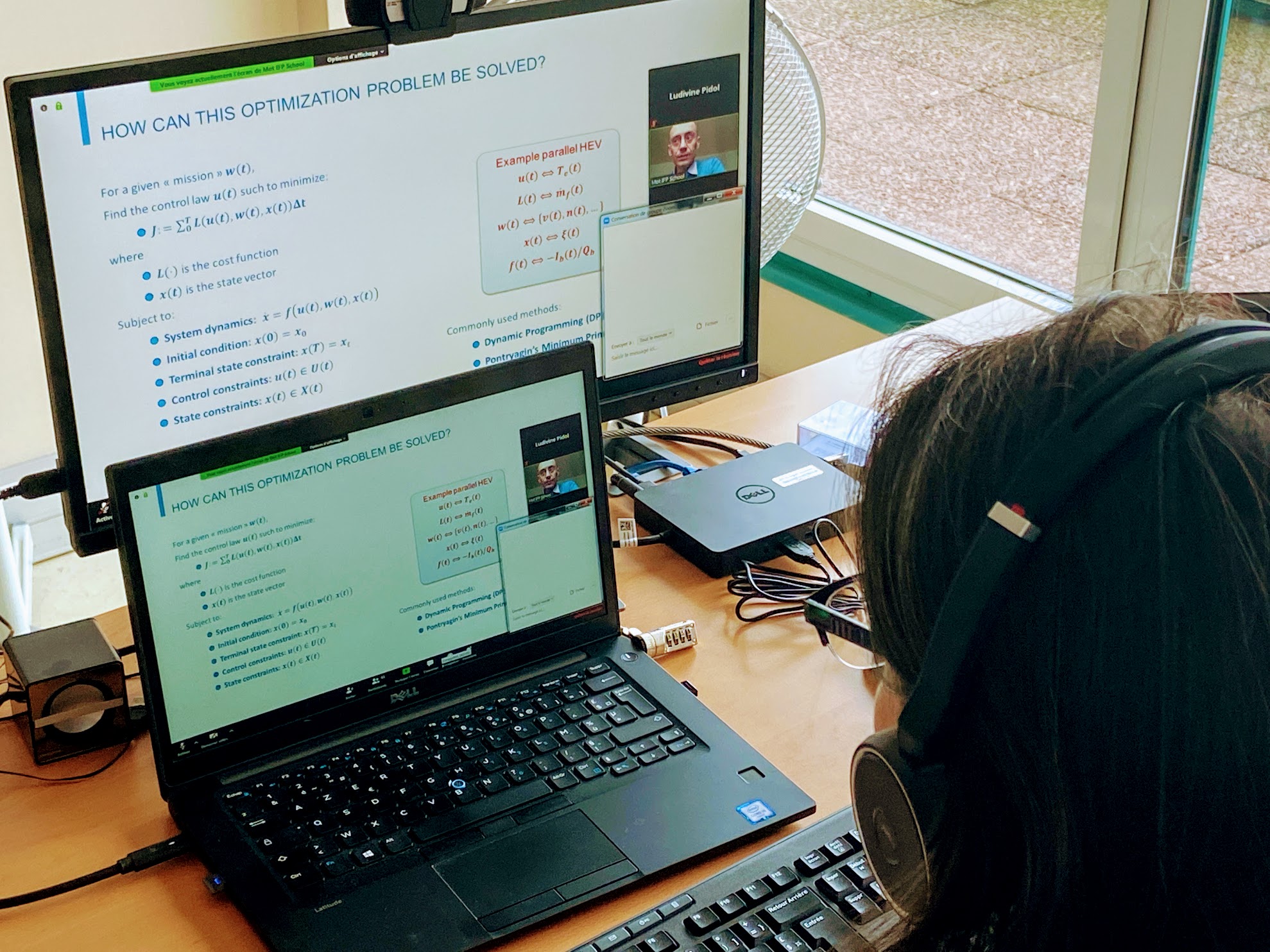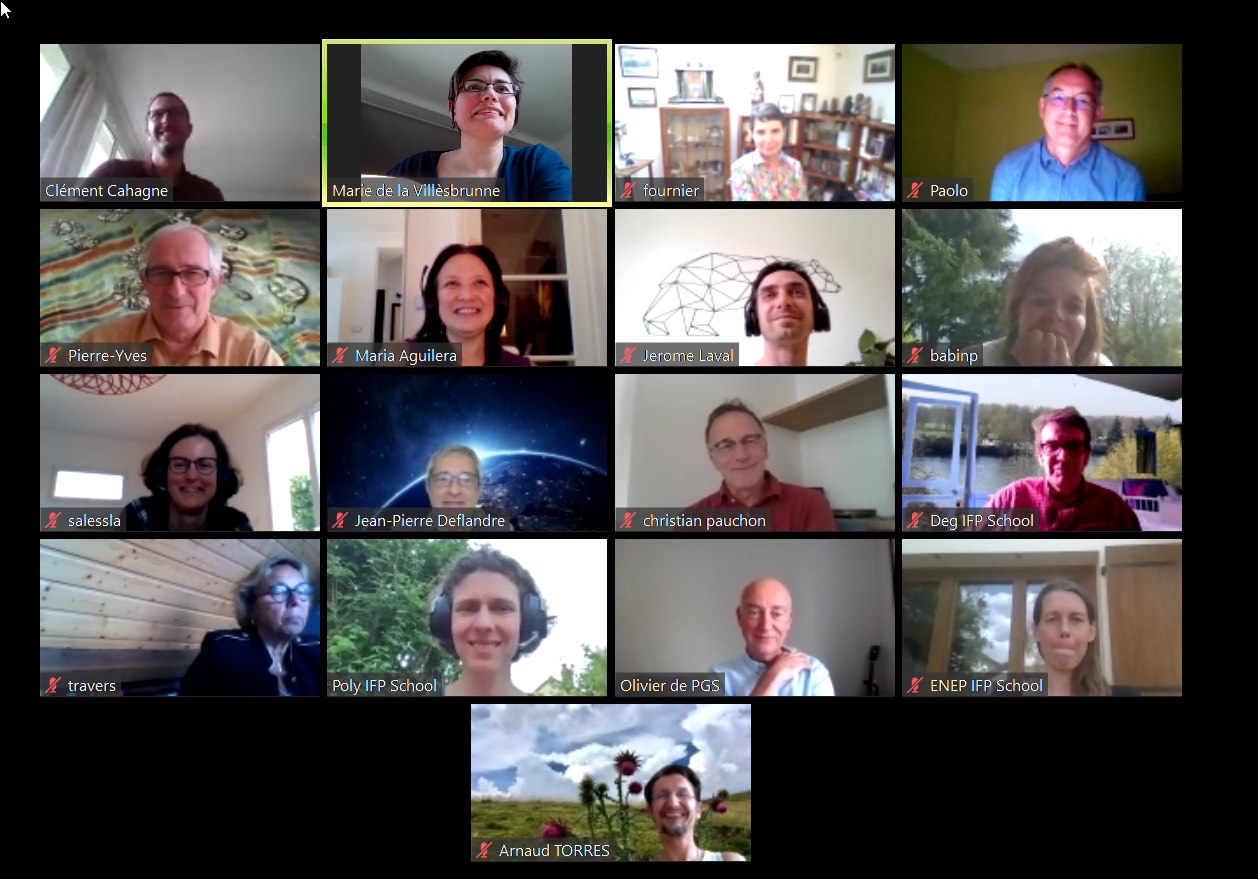The School during lockdown
Teaching at IFP School following the closure of the campus on 16 March
On 16 March 2020, IFP School closed its campus at Rueil-Malmaison due to the Covid-19 epidemic. In the face of this unprecedented situation, the School successfully adapted its organization in order to continue to deliver its programs to more than 300 students.
Remote teaching
IFP School’s teaching staff quickly rallied to support their students and provide online solutions enabling them to continue their studies.
In the space of just two days, everything was in place to enable the delivery of the first online classes on 16 March for all of the School’s course programs.

Teaching staff adapted their modules to deliver them via collaboration platforms such as Rise Up (Learning Management System) and Microsoft Teams, video conference applications such as Zoom and Skype, and interactive teaching and learning tools such as Wooclap and Genially.
This was also the case for the Executive Master of Management in Energy, a program delivered in English in partnership with the BI Norwegian Business School. The 100% online program was launched on 16 March. Some international students expected at Rueil-Malmaison for their courses were stuck in their own countries due to the health situation. Despite this, they were able to pursue their studies, from as far afield as China and Brazil.
Teaching staff also recorded their online video sessions, to provide access to anyone unable to participate live. They organized work sessions in small groups via Zoom and WhatsApp to provide students with the best possible learning environment.
“When the Covid-19 crisis forced countries to go into lockdown, my fellow students and I feared that the Executive Master would be postponed”, says Waldemar Szemat Vielma, a student and program representative.
“But the teaching staff rallied to come up with a back-up plan and maintain the initial program schedule. The results exceeded our expectations!”, he explains.
Hence, throughout the 8 weeks of lockdown in France, more than 900 hours of virtual modules were delivered by IFP School’s teaching staff and outside lecturers.
“Our investments in the introduction of innovative teaching methods enabled us to bounce back quickly”, underlines Christine Travers, IFP School Dean.
“Our teaching staff ensured the continuity of the course programs with a high level of professionalism and personal commitment. They demonstrated immense creativity. I’m extremely proud of them!”, she emphasizes.
The expertise of the IT Unit and Lab e•nov
To help them organize the transition to exclusively online and remote teaching and learning in the space of a few days, teaching staff were supported by the expertise of the IT Unit and Lab e•nov, IFP School’s innovation and digital cultures laboratory.
On 14 March, all School staff who did not yet have one were provided with a laptop computer by the IT Unit.
“Some were even able to recover their screens, keyboards and mice in order to set up a home-based work environment”, explains Christophe Corlay, manager of IFP School’s IT Unit.
“We also loaned equipment to a few international students in need, as well as to outside lecturers who required it”, he adds.
In partnership with IFPEN’s IT Services Division, the IT Unit also ensured that all students and teaching staff could pursue their course modules using the principal business software.
As for the Lab e•nov team, it offered teaching staff weekly webinars to help them gradually set up their online programs, via the available technical solutions as well as the implementation of good practices. The latter range from the staging of videoconference spaces to the introduction of “class life sessions” to allow teaching staff and students to interact more informally.
“Remote teaching cannot be improvised!”, observes Olivier Lerat, Petroleum Geosciences program manager. “It’s more than a full-time job!”
To enable them to relax and recharge their batteries, the Lab’ Innov team also launched “Lockdown Cafés”, convivial virtual spaces.
“We are there to support our colleagues”, points out Marie de la Villèsbrunne, course designer at Lab e•nov.

Renewed support of industrial partners
Throughout these unusual times, the School was also able to count on the support of its industrial partners. Several companies provided students with tools and resources.
Given the exceptional circumstances, DrillScan allowed students on the Petroleum Engineering and Project Development (DEG) program to install the WellScan drilling engineering software on their own personal computers to enable them to continue their case studies.
Likewise, AVEVA generously lent its PRO/II software for the process simulation modules within the Energy and Processes (ENEP) program.
We would like to take this opportunity to thank them very much.
Skills validation: a sizable challenge
The School put in place four forms of assessment: projects and oral exams defended remotely via videoconference, multiple choice questionnaires (online and open for a specified period) and traditional exams invigilated virtually in line with French Ministry for Higher Education, Research and Innovation recommendations.
Virtual field placements
While digital technology prevailed throughout this period at IFP School, it clearly has its limits for a school that is very much oriented towards industrial application. The School thus turned to virtual reality to help students learn the practical techniques associated with a particular profession.
Students on the Energy and Processes (ENEP) and Petroleum Engineering and Project Development (DEG) programs thus took part in “School Lanta”, a day-long session of virtual challenges within an industrial site.
These included identifying and inspecting industrial facilities and starting a pump, for example.
“There is no perfect substitute for a field placement, but virtual reality enables us to transport students on site”, explains Olivier Bernaert, Lab e•nov manager. "We gamified a training path. Students had to virtually visit various industrial site units and take a quiz at the end of each exercise", he adds.
2020: reinventing the new academic year
During this period, it was important to ensure the continuity of the course programs and maintain the links between IFP School’s students, teaching staff and personnel. Thanks to the determination and solidarity of everyone concerned, the challenge was met and the academic year successfully completed.
Work is now continuing to prepare for the start of the next academic year, which will be a hybrid year combining both remote learning and in-person teaching.
Author of the article: Meyling Siu